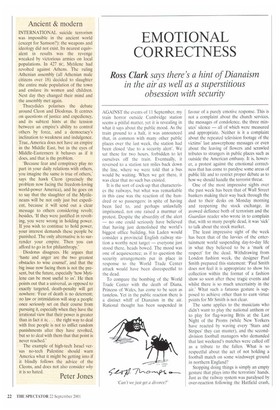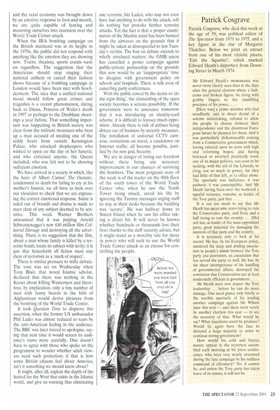EMOTIONAL CORRECTNESS
Ross Clark says there's a hint of Dianaism
in the air as well as a superstitious obsession with security
AGAINST the events of 11 September, my train horror outside Cambridge station seems a pitiful matter, yet it is revealing in what it says about the public mood. As the train ground to a halt, it was announced that, in common with many other public places over the last week, the station had been closed 'due to a security alert'. We sat there for two hours, forbidden to let ourselves off the train. Eventually, it reversed to a station ten miles back down the line, where we were told that a bus would be waiting. When we got there, it was clear that no such bus existed.
It is the sort of cock-up that characterises the railways, but what was remarkable in this case was the reaction of the hundred or so passengers: in spite of having been lied to, and perhaps unlawfully imprisoned, not one raised a murmur of protest. Despite the absurdity of the alert — no one could seriously have believed that having just demolished the world's biggest office building, bin Laden would consider a provincial English railway station a worthy next target — everyone just stood there, heads bowed. The mood was one of acquiescence; as if to question the security arrangements put in place in response to the World Trade Center attack would have been disrespectful to the dead.
To compare the bombing of the World Trade Center with the death of Diana, Princess of Wales, has come to be seen as tasteless. Yet in the public reaction there is a distinct whiff of Dianaism in the air. Rational thought has been suspended in favour of a purely emotive response. This is not a complaint about the church services, the messages of condolence, the three minutes' silence — all of which were measured and appropriate. Neither is it a complaint about the repeated television footage of the victims' last answerphone messages or even about the leaving of flowers and scrawled tributes to strangers in public places such as outside the American embassy. It is, however, a protest against the emotional correctness that has come to paralyse some areas of public life and to restrict proper debate as to how we should handle the terrorist threat.
One of the most impressive sights over the past week has been that of Wall Street bankers making their way back through the dust to their desks on Monday morning and reopening the stock exchange, in avowed defiance both of terrorism and the Guardian reader who wrote in to complain that, with so many people dead, it was 'sick' to talk about the stock market.
The least impressive sight of the week has been that of the luvvies of the entertainment world suspending day-to-day life in what they believed to be a 'mark of respect' for the dead. Withdrawing from London fashion week, the designer Paul Smith prepared this statement: 'Paul Smith does not feel it is appropriate to show his collection within the format of a fashion show so soon after these tragic events and whilst there is so much uncertainty in the air.' What such a fatuous gesture is supposed to achieve other than to earn virtue points for Mr Smith is not clear.
The same applies to the musicians who didn't want to play the national anthem or to play for flag-waving Brits at the Last Night of the Proms (while New Yorkers have reacted by waving every 'Stars and Stripes' they can muster), and the seconddivision football managers who demanded that last weekend's matches were called off as a tribute to the fallen. What is so respectful about the act of not holding a football match on some windswept ground in northern England?
Stopping doing things is simply an empty gesture that plays into the terrorists' hands. Just as the railway system was paralysed by over-reaction following the Hatfield crash, and the rural economy was brought down by an emotive response to foot-and-mouth, we are quite capable of fearing and mourning ourselves into recession over the World Trade Center attack.
When the IRA bombing campaign on the British mainland was at its height in the 1970s, the public did not respond with anything like the emotion they are showing now. Trains, theatres, sports events went on regardless. The suggestion that the Americans should stop singing their national anthem or cancel their fashion shows because of a bombing campaign in London would have been met with bewilderment. The idea that a unified national mood should follow great crimes and tragedies is a recent phenomenon, dating back to Diana, Princess of Wales's death in 1997 or perhaps to the Dunblane shootings a year before. That something important was happening in British society was clear from the militant mourners who beat up a man accused of stealing one of the teddy bears from outside Kensington Palace, who attacked shopkeepers who wished to open on the day of her funeral, and who criticised anyone, the Queen included, who was felt not to be showing sufficient emotion.
We have arrived in a society in which, like the hero of Albert Camus' The Outsider, condemned to death for failing to cry at his mother's funeral, we all have to look over our shoulders to check that we are expressing the correct emotional response. Satire is ruled out of bounds and drama is made to steer clear of any subject deemed to be sensitive. This week Warner Brothers announced that it was pulping Arnold Schwarzenegger's new £40 million film Collateral Damage and destroying all the advertising. There is no suggestion that the film, about a man whose family is killed by a terrorist bomb, treats its subject with levity; it is just that henceforth all fiction must stay clear of terrorism as a 'mark of respect'.
There is similar pressure to stifle debate. The tone was set on Wednesday when Tony Blair, that noted Islamic scholar, declared that there was nothing in the Koran about killing Westerners and therefore, by implication, only a tiny number of men with funny beards in the hills of Afghanistan would derive pleasure from the bombing of the World Trade Center.
It took Question Time to disprove this assertion, when the former US ambassador Phil Lader was almost reduced to tears by the anti-American feeling in the audience. The BBC was later forced to apologise, saying that next time it would screen its audience's views more carefully. One doesn't have to agree with those who spoke on the programme to wonder whether adult viewers need such protection; if that is how some British citizens feel about America, isn't it something we should know about?
It might, after all, explain the depth of the hatred for the West that exists in the Islamic world, and give us warning that eliminating
one terrorist, bin Laden, who may not even have had anything to do with the attack, will do nothing but provoke further terrorist attacks. Yet the fact is that a proper examination of the Muslim mind has been banned from the airwaves on the grounds that it might be taken as disrespectful to last Tuesday's victims. The ban on debate extends to wholly unrelated matters: the GMB union has cancelled a poster campaign against public–private partnership on the grounds that now would be an 'inappropriate' time to disagree with government policy on schools and hospitals. There is talk even of cancelling party conferences.
With the public cowed by the desire to 'do the right thing', the dismantling of the open society becomes a serious possibility. If the government were to announce tomorrow that it was introducing an identity-card scheme, it is difficult to foresee much opposition. Already there is talk of airlines being driven out of business by security measures. The installation of universal CCTV cameras, restrictions on travel, a crackdown on Internet traffic: all become possible, justified by the new god, Security.
We are in danger of losing our freedom without there being any necessary improvement in our chances of surviving the bombers. The most poignant story of the week is of the trader on the 90th floor of the south tower of the World Trade Center who, when he saw the North Tower being struck, saved his life by ignoring the Tannoy messages urging staff to stay at their desks because the building was 'secure'. He was halfway home to Staten Island when he saw his office taking a direct hit. It will never be known whether hundreds or thousands lost their lives thanks to the duff security advice, but it might stand as a morality tale for those in power who will seek to use the World Trade Center attack as an excuse for controlling the people.











































































 Previous page
Previous page